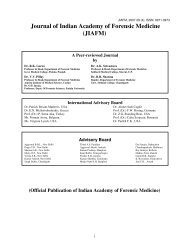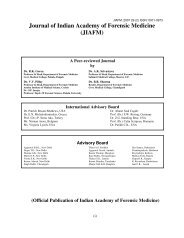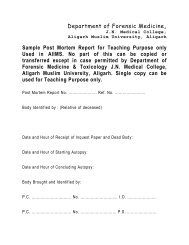jiafm-35-1 - forensic medicine
jiafm-35-1 - forensic medicine
jiafm-35-1 - forensic medicine
Create successful ePaper yourself
Turn your PDF publications into a flip-book with our unique Google optimized e-Paper software.
J Indian Acad Forensic Med. Jan-March 2013, Vol. <strong>35</strong>, No. 1 ISSN 0971-0973<br />
Original Research Paper<br />
Patient’s Awareness, Attitude, Understanding and<br />
Perceptions towards Legal Nature of Informed Consent<br />
*Rajesh DR, **Abhishek Singh, *Mukul Chopra, *Gaurav P Singh, *Venkteshan M, ***Anu Bhardwaj,<br />
****Balbir Kaur, *****OP Aggarwal<br />
Abstract<br />
Patient’s autonomy is an imperative issue in the health service area. It is a known fact that<br />
patient’s awareness of legal and ethical issues related to the consent process is often limited. The present<br />
study was therefore conducted to ascertain patient’s awareness, attitude and perceptions towards Legal<br />
nature of informed consent. A structured interview schedule was developed and handed out to 555<br />
patients in the Surgery department during January 2011 to June 2011. A great deal of misconception<br />
regarding the legal status of consent was seen. 88% of participants believed that they had no right to<br />
change their mind after signing the consent. 61.6% trusted their doctor to do the right thing and did not<br />
mind what happened to them provided they were made better. Level of understanding was satisfactory in<br />
only 32% of patients. The study concludes that there exists a vast discrepancy between the informed<br />
consent that perceived by patients. Current consent procedures seem inadequate as a means for the<br />
expression of autonomous choice and their ethical standing can be called into question.<br />
Key Words: Informed consent, Legal, Education level, Patients’ Rights<br />
Introduction:<br />
Autonomy of patients is an important<br />
issue in the health service area. Informed<br />
consent is an autonomous action by a subject or<br />
patient that authorizes a professional either to<br />
involve the subject in research or to initiate a<br />
medical plan for the patient. [1] It is the<br />
fundamental mechanism whereby the physician<br />
informs the patient about the options for the<br />
diagnosis and treatment of the patient's illness.<br />
It is not just a form to be signed as a<br />
hospital formality, but a process, which ensures<br />
respect for persons through provision of<br />
thoughtful consent for an option to decide on the<br />
best possible treatment in disease processes, so<br />
that the patient can make a rational voluntary<br />
decision regarding what he/she wants to be<br />
done. [1, 2]<br />
Corresponding Author:<br />
*Resident,<br />
Department of Forensic Medicine and Toxicology<br />
MMISMS&R Mullana, Ambala 133207<br />
E-mail: rajeshdd86@gmail.com<br />
**Resident, Dept. of Community Medicine<br />
*Resident, Dept. of FMT<br />
***Associate Prof, Dept. of Community Medicine.<br />
****Prof, Dept. of FMT<br />
****Prof & Head, Dept. of FMT<br />
DOR:31.7.12 DOA:8.2.13<br />
Informed consent is the process of<br />
agreeing to take part in a study based on access<br />
to all relevant and easily digestible information<br />
about what participation means in particular, in<br />
terms of harms and benefits. [3]<br />
Informed Consent originates from the<br />
legal and ethical rights of the patient have to<br />
direct what happens to his/her body and from<br />
the ethical duty of the physician to involve the<br />
patient in his/her health care. The most<br />
important goal of informed consent is that the<br />
patient should have an opportunity to be an<br />
informed participant in his health care decisions<br />
so it acts as a safeguard to ensure the<br />
preservation of individual rights. [1]<br />
Patients often feel powerless and<br />
vulnerable and it is a proven fact that patient’s<br />
awareness of legal and ethical issues related to<br />
the consent process is often limited. The<br />
informed consent process should be seen as an<br />
invitation to him to participate in his health care<br />
decisions. The objective of this study is to define<br />
patient’s awareness of legal issues, attitude<br />
towards consent. Additional objective of this<br />
study is to determine what patients want to know<br />
and to find out whether or not the patients<br />
actually understand what has been explained to<br />
them.<br />
Materials and Methods:<br />
The present observational cross<br />
sectional study was carried out in the Surgery<br />
Department between January 2011 to June<br />
40


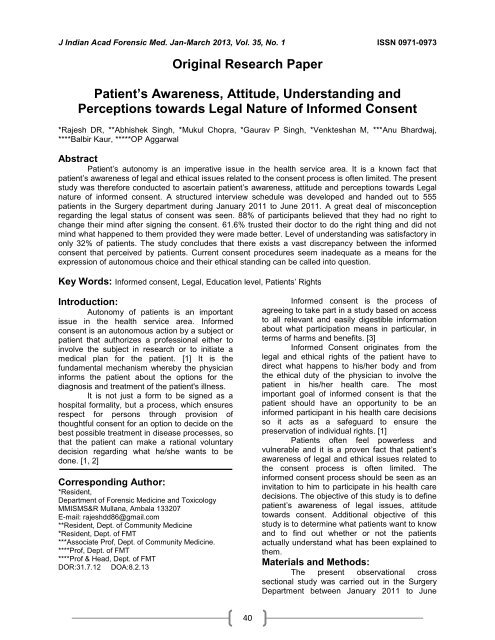
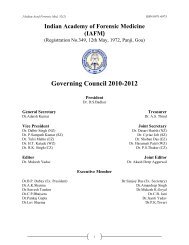
![syllabus in forensic medicine for m.b.b.s. students in india [pdf]](https://img.yumpu.com/48405011/1/190x245/syllabus-in-forensic-medicine-for-mbbs-students-in-india-pdf.jpg?quality=85)
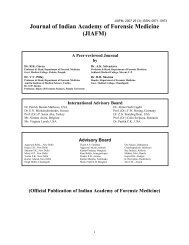
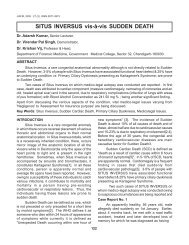
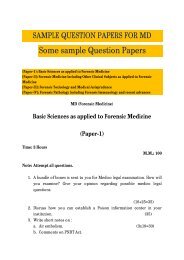
![SPOTTING IN FORENSIC MEDICINE [pdf]](https://img.yumpu.com/45856557/1/190x245/spotting-in-forensic-medicine-pdf.jpg?quality=85)
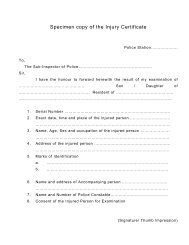
![JAFM-33-2, April-June, 2011 [PDF] - forensic medicine](https://img.yumpu.com/43461356/1/190x245/jafm-33-2-april-june-2011-pdf-forensic-medicine.jpg?quality=85)
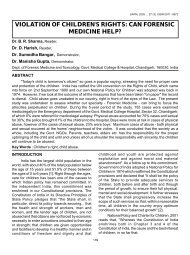
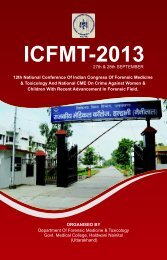
![JIAFM-33-4, October-December, 2011 [PDF] - forensic medicine](https://img.yumpu.com/31013278/1/190x245/jiafm-33-4-october-december-2011-pdf-forensic-medicine.jpg?quality=85)
